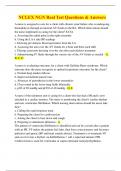Exam (elaborations)
NCLEX NGN Real Test 2024 Questions & Answers
- Course
- Institution
NCLEX NGN Real Test 2024 Questions & Answers-A nurse is assigned to care for a client with chronic renal failure who is undergoing hemodialysis through an internal AV fistula in the RA. Which intervention should the nurse implement in caring for the client? SATA a. Assessing the radial pulse in th...
[Show more]



